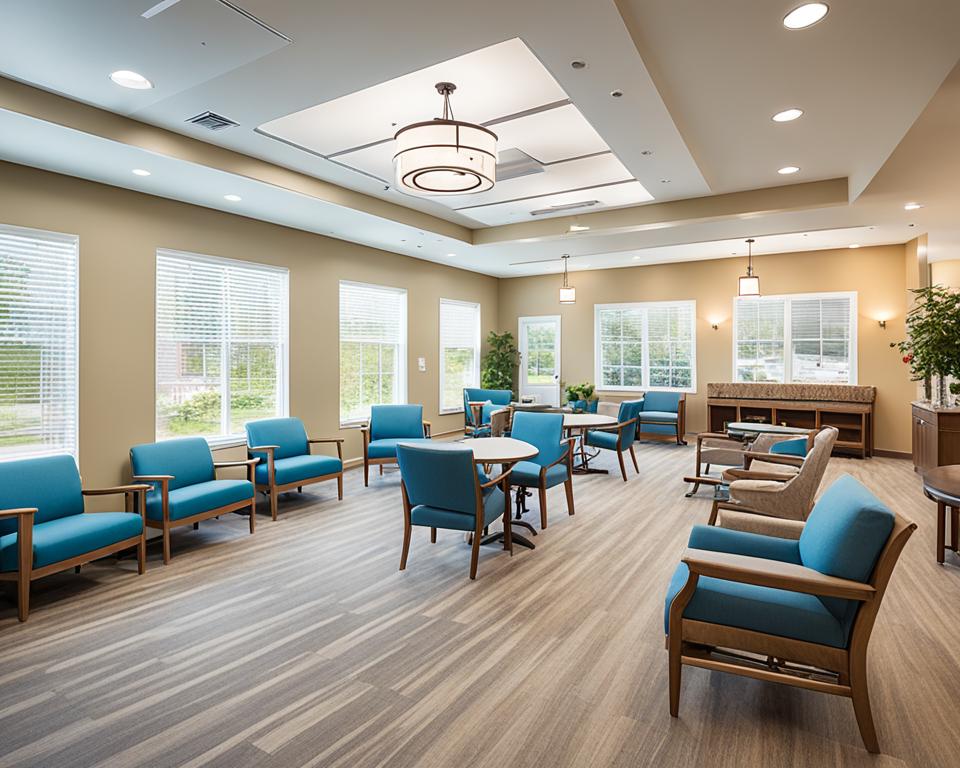Are you facing the difficult decision of when to move your loved one from assisted living to a nursing home? It’s a question many of us grapple with as we strive to provide the best care possible for our aging family members. But how do you know when the time is right? What are the key signs and considerations to keep in mind?
In this article, I will explore the key signs that indicate it may be time to consider a move to a nursing home. From the need for 24-hour care to developing complex medical conditions, we will delve into the factors that can help guide your decision-making process. Together, let’s uncover the best care option for your loved one.
Needing 24-hour care
When it comes to the level of care needed, assisted living and nursing homes offer different options. While assisted living communities can provide round-the-clock care, it is often limited to minor assistance. On the other hand, nursing homes, also known as skilled nursing facilities, are specifically designed to provide a high level of 24/7 care.
In nursing homes, this higher level of care is typically administered by a dedicated team of professionals, including licensed practical nurses, registered nurses, and aides. These skilled caregivers are equipped to handle a range of medical needs and provide assistance with Activities of Daily Living (ADLs).
Nursing homes are equipped to handle everyday and emergency medical needs, such as administering IV therapy, placing and maintaining catheters, monitoring blood pressure, and providing respiratory therapy. This level of care ensures that seniors have access to round-the-clock medical attention and support.
Seniors who require nursing home care often need assistance with at least three ADLs and may struggle with mobility, requiring help with walking or the use of a wheelchair. Additionally, incontinence is a common issue that nursing homes are equipped to manage effectively, ensuring a high standard of care.
Skilled Nursing Facilities: Providing Comprehensive Care
In a nursing home setting, the availability of skilled nursing staff sets it apart from assisted living communities. Skilled nursing facilities offer a wide range of services to cater to the complex needs of residents requiring 24-hour care. This includes:
- Administering medications
- Assisting with ADLs (Activities of Daily Living)
- Providing rehabilitation therapies
- Offering specialized medical services
This level of comprehensive care ensures that any medical or personal needs of the residents are met promptly and professionally.
Developing complex medical conditions
When seniors start to develop complex medical conditions, it may be time to move into a nursing home. These conditions often require skilled nursing care and specialized assistance that assisted living communities may not be equipped to provide.
Examples of complex medical conditions that may necessitate a move to a nursing home include chronic illnesses, post-surgical care, the need for medication management, and conditions such as Alzheimer’s disease and other types of dementia. For seniors with cognitive decline, facilities geared specifically for memory care can offer tailored support to meet their unique needs.
Nursing homes are staffed by skilled healthcare professionals who can provide the necessary medical care and supervision for seniors with complex medical conditions. These professionals can assist with medication administration, monitor vital signs, and provide specialized treatments as needed.
“Moving to a nursing home can ensure that seniors receive the care and attention they require for their complex medical conditions. The staff at nursing homes are trained to handle a wide range of medical needs and can provide a higher level of medical care compared to assisted living communities.”
Memory Care Facilities for Alzheimer’s Disease
For seniors diagnosed with Alzheimer’s disease or other forms of dementia, memory care facilities offer specialized care and support. These facilities have staff trained in dementia care and provide a secure and nurturing environment specifically designed to meet the unique needs of individuals with memory impairment.
| Benefits of Memory Care Facilities: | Features of Memory Care Facilities: |
|---|---|
|
|
Memory care facilities strive to create a supportive and engaging environment where individuals with Alzheimer’s disease can thrive. These facilities prioritize maintaining the dignity and quality of life of their residents while ensuring their safety and well-being.
Benefits of Skilled Nursing Care for Complex Medical Conditions
Skilled nursing care provided in nursing homes offers several benefits for seniors with complex medical conditions:
- 24/7 access to skilled healthcare professionals
- Specialized medical treatments and therapies
- Medication management and administration
- Regular monitoring of vital signs and health status
- Assistance with activities of daily living
These comprehensive care services can help manage and improve the health and well-being of seniors with complex medical conditions, ensuring they receive the necessary support and medical attention they require.
Requiring hospice or palliative care
When seniors face terminal illnesses with a life expectancy of less than six months and choose not to pursue or continue treatments, they may consider hospice care. Hospice care is primarily focused on providing comfort and support to the patient during their final stage of life. It aims to enhance the quality of life for the individual and their loved ones, ensuring their physical, emotional, and spiritual needs are met.
On the other hand, palliative care is suitable for individuals with serious medical conditions, regardless of life expectancy. The primary goal of palliative care is to reduce suffering and enhance the patient’s overall well-being by managing pain, symptoms, and addressing the underlying conditions. It provides a comprehensive approach to care, ensuring that the patient’s physical, emotional, and psychosocial needs are addressed.
Nursing homes typically offer both hospice and palliative care services, providing the necessary support and comfort for seniors in need. These care facilities have specially trained staff members who work closely with the patient, their families, and the medical team to develop customized care plans that prioritize comfort, dignity, and quality of life. By offering hospice and palliative care within the nursing home setting, seniors and their families can have peace of mind knowing that their loved ones are receiving compassionate and comprehensive care.
The Benefits of Hospice and Palliative Care in Nursing Homes
“Hospice and palliative care allow seniors to receive specialized medical care and support while residing in a comfortable and familiar environment. It promotes a holistic approach to care, addressing not only the physical needs of the patient but also their emotional, social, and spiritual well-being.” – Dr. Elizabeth Davis, Geriatric Specialist
By providing hospice and palliative care services, nursing homes offer the following benefits:
- Expert Medical Care: Nursing homes have a team of healthcare professionals, including doctors, nurses, and specialists, who are experienced in providing end-of-life care and pain management.
- 24/7 Support: Seniors and their families have access to around-the-clock support from trained staff members who are knowledgeable and compassionate in addressing their unique needs.
- Emotional and Spiritual Support: Hospice and palliative care teams not only focus on physical comfort but also provide emotional and spiritual support to both the patient and their loved ones.
- Reduced Stress: By receiving comprehensive care within a nursing home setting, seniors and their families can avoid the additional stress of coordinating multiple healthcare providers and navigating different care settings.
- Comfort and Familiarity: Remaining in a familiar environment surrounded by personal belongings and loved ones can contribute to a sense of comfort and emotional well-being for the senior.
Hospice and palliative care can significantly improve the quality of life for seniors facing terminal illnesses or serious medical conditions. By providing comfort, reducing suffering, and addressing the holistic needs of the individual, nursing homes play a vital role in ensuring that seniors receive the care and support they deserve during their final stages of life.
| Benefits of Hospice and Palliative Care in Nursing Homes |
|---|
| Expert Medical Care |
| 24/7 Support |
| Emotional and Spiritual Support |
| Reduced Stress |
| Comfort and Familiarity |
Conclusion
Deciding when to transition from assisted living to a nursing home is a critical consideration, as it directly impacts the quality of care received by your loved one. Various factors, including the need for 24-hour care, complex medical conditions, hospice or palliative care requirements, immobility, frequent hospital visits, increased falls, medication administration, and assistance with living expenses, signal that a nursing home may be the best option for their well-being.
To ensure the best care, it is essential to carefully evaluate the available options and research different nursing homes. Take the time to visit and assess each facility, paying attention to the level of care, staff qualifications, and the overall living environment. Additionally, consider the costs and funding options associated with nursing home care to make an informed decision.
Moving from assisted living to a nursing home can be an emotional and challenging transition, both for the individual and their family. However, prioritizing the best care and support for your loved one is crucial. By carefully considering their changing needs and exploring the available options, you can provide them with the highest level of care and ensure their well-being in their new home.
FAQ
What are the key signs that it may be time to move from assisted living to a nursing home?
The key signs include needing 24-hour care, developing complex medical conditions, requiring hospice or palliative care, becoming bedridden or needing a wheelchair, having frequent visits to the hospital, falling more often, needing medication administration, and wanting help with the cost of living.
What is the difference between assisted living and nursing home care?
Assisted living communities provide round-the-clock care but primarily for minor assistance. Nursing homes, also known as skilled nursing facilities, provide a high level of 24/7 care and have licensed practical nurses, registered nurses, and aides on staff to assist with ADLs (Activities of Daily Living) and medical needs.
What kind of care do nursing homes provide for seniors with complex medical conditions?
Nursing homes can provide specialized care for seniors with complex medical conditions such as chronic illnesses, post-surgical care, medication management, Alzheimer’s disease, and other types of dementia. Facilities geared specifically for memory care should be considered for seniors experiencing cognitive decline.
What is the difference between hospice care and palliative care in a nursing home?
Hospice care is for terminally ill seniors with less than six months to live who choose not to undergo or continue treatments. It focuses on providing comfort during this time. Palliative care, on the other hand, is for seniors with serious medical conditions and aims to reduce suffering while addressing underlying conditions.
How can I make the decision to move from assisted living to a nursing home?
Deciding when to move from assisted living to a nursing home requires careful consideration of the individual’s changing needs and available options. Thoroughly evaluate the signs, research and visit different nursing homes, and consider the costs and funding options to prioritize the best care and support for your loved one.









